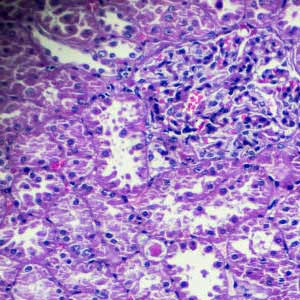Renal biopsy in Vijayawada
A renal biopsy in Vijayawada is a procedure that is used to extricate kidney tissue for lab examination. The word "Renal" depicts the kidneys, so a renal biopsy is likewise known as a kidney biopsy.
Get in touch with Dr. Anvesh Golla for renal biopsy who is the best nephrologist in Vijayawada.
There are 2 methods for carrying out a renal biopsy:
- Percutaneous biopsy (renal needle biopsy): This is the most common sort of renal biopsy. For this procedure, a specialist places a thin biopsy needle through the skin to eliminate your kidney tissue. They might utilize a ultrasound or CT scan to guide the needle to a particular region of the kidney.
- Open biopsy: For this procedure, your doctor makes a cut in the skin close to the kidneys. This permits the doctor to take a look at the kidneys and decide the region from which the tissue samples ought to be taken.
Reason for Renal Biopsy
Renal biopsy can recognise what is disrupting your normal kidney function. Healthy people have 2 kidneys that carry out numerous functions. Kidneys must:
- eliminate urea (fluid waste) from the blood by producing the urine
- keep a balance of chemicals, like sodium and potassium, in the blood
- supply the hormone, which upholds red blood cell growth
- control the blood pressure by generating the hormone renin
- assist with initiating the hormone calcitriol, which controls calcium absorption and calcium blood levels.

What happens during a kidney biopsy?
During a kidney biopsy, a specialist will collect a sample of tissue from your kidney. Most biopsies are done through your back, although individuals with a transplanted kidney have the biopsy through their lower abdomen.
Your doctor will utilize one of these methods to take the sample:
- Percutaneous biopsy: this is the more common sort of kidney biopsy, a specialist numbs the skin situated over the kidney and places a needle to take a small tissue sample from the kidney. Your doctor might utilize ultrasound imaging to direct the needle to the best location in the kidney.
- Open biopsy: In an open biopsy, a specialist makes an entry point, eliminates tissue from the kidney, and closes the cut with stitches. Your doctor will give you sedation (medication that makes you sleep) so you don't feel pain during the procedure. This sort of biopsy is rare except at the time of kidney transplant.
What are the complications of a kidney biopsy?
The dangers of a kidney biopsy are small, yet difficulties can occur. Certain individuals experience bleeding after the procedure. Extreme bleeding could need further treatment.
Different complications of a kidney biopsy might include:
- Dizziness.
- Fever.
- Inability to urinate
- Pain at the biopsy site.
- Urine infection
Contact Dr. Anvesh Golla for Peritoneal Dialysis In Vijayawada
